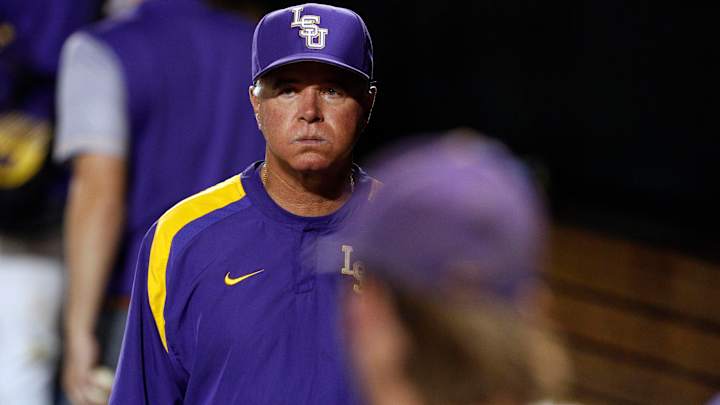Coach Paul Mainieri Addresses How Spring Athletes Receiving Extra Year of Eligibility Will Affect LSU Baseball

Every year of his life since he was five years old, LSU coach Paul Mainieri has been on a baseball field in the month of April. Whether it was next to his father as a young boy, on the field as a player or for the last 38 years as a coach, the baseball diamond has always been there this time of year.
So as Mainieri sat and spoke with the media Thursday afternoon via "Zoom" video conference, there was an eerie sensation that came over him.
“It almost feels like the twilight zone. It’s so surreal. You go outside and think life is normal, than you put on the news and hear everything that’s going on," Mainieri said. "It might be the first time in my life I haven’t spent the month of April on a baseball field.”
The way the 2020 season ended was just as strange a feeling as Mainieri learned via an appearance on the Paul Finebaum show that the College World Series was cancelled. A few days later, the entire season was over as Mainieri had to break the news to 35 of his players via phone conference to come clear out their lockers by 3:30 p.m.
"I never thought I'd hold a press conference from my bedroom, I never thought I'd have a staff meeting through virtual zoom but nothing like this has ever happened to me like this in my career as a coach," Mainieri said.
So as he steers his focus to the 2021 season, there is still much that is unknown that could shape the way LSU's roster looks in a year's time. On Monday, the NCAA voted to grant all spring sport athletes an extra year of eligibility as a result of the COVID-19 outbreak costing those athletes their seasons.
DI Council grants waiver to allow additional eligibility for spring sport athletes whose seasons were impacted by COVID-19: https://t.co/aC03MEa5UQ pic.twitter.com/XeVaxI85Ib
— NCAA News (@NCAA_PR) March 30, 2020
On the surface, it's great that the NCAA made the correct decision but for baseball in particular, there are still some questions Mainieri has. The NCAA's ruling will allow seniors to return to school without it affecting the roster size.
LSU currently has pitchers Matthew Beck and Aaron George, both of whom wish to return to school next year Mainieri said Thursday.
"There are some schools that won't be able to pay for their seniors to come back but we will be able to fortunately," Mainieri said.
But what about the draft eligible sophomores and juniors? Mainieri said he thought entering the season there’d be seven or eight juniors that could’ve been drafted and signed with the MLB.
With the MLB potentially limiting the draft to as many as five rounds, if some of those draft eligible players don't get drafted and want to return to school, there very well could be a situation where Mainieri would have to turn away some players.
"I think we should treat our juniors the way we're treating our seniors," Mainieri said. "These kids aren't just going to come back to school and you can't increase their scholarship so I think there should be relief for the junior class if they do come back to school and not have to worry about losing their scholarship.
"I've got high school kids that have signed to come to LSU next year and what are you supposed to do, throw your juniors out on the curb because they weren't able to be drafted?" Mainieri said. "I just think if the NCAA really wants to see this thing through then they have to look at baseball as a unique sport."
The reason college coaches might have some tough decisions in regards to their juniors is based on the number of high school prospects that end up coming to school because they don't get drafted either.
Because LSU, like all of the elite level programs, over recruits, the number of high school prospects that ultimately decide to come to LSU could increase exponentially because of a smaller draft. If seniors are the only class receiving scholarship relief, it would mean returning juniors would likely have some of if not all of their scholarships revoked.
“We have this class of 17 players and you typically think you might lose five. Now we may lose 1-2. You have to over recruit. That's the double-edged sword of being at a school that gets good players," Mainieri said. "If the NCAA could give us some relief in regards to the amount of scholarships and the roster size not just exclusive of the seniors, that'd be ideal. Even if it's just temporary for this year, if the NCAA could give us a couple of extra scholarships for this year and lift the hard cap of 27 per team, then I think everybody could get through this next year."

Glen West has been a beat reporter covering LSU football, basketball and baseball since 2017. West has written for the Daily Reveille, Rivals and the Advocate as a stringer covering prep sports as well. He's easy to pick out from a crowd as well, standing 6-foot-10 with a killer jump shot.
Follow @glenwest21